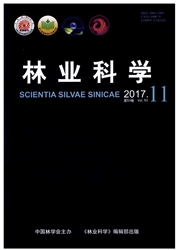

 中文摘要:
中文摘要:
以江西省8个县602户农户调查数据为基础,运用定量统计方法,分析集体林分权条件下的林地细碎化程度、农户投入水平及与林地产出的关系,以验证集体林权制度改革后的农户林地细碎化经营是否具有经济合理性。实证结果表明:以S指数衡量,江西省样本县林地细碎化的程度达到0.55,受访农户林地细碎化程度与地貌特征之间未出现明显的关联性;以户均数据衡量,受访农户从家庭收入中用于林业投资的比例维持在30%左右,且传统林业重点县的农户林业投入比例要明显高于非林业重点县。计量模型计算结果表明,S指数衡量的林地细碎化程度对农户林业投入和林地产出水平均构成负向影响趋势;曲线模型临界值分析表明,当农户林地细碎化程度低于0.23或高于0.69时,农户投资林业的积极性则随着林地细碎化程度高低呈现正向变化趋势,当林地细碎化程度低于0.22或高于0.67时,林地细碎化程度对林地产出水平表现为负向影响趋势。
 英文摘要:
英文摘要:
In this study,we use data collected in a survey on 602 households of 8 counties in Jiangxi Province to analyze the relationship between the fragmentizing degree of woodland,farmers' investing level and the output level of forests under the condition of the separating powers of collective forests.With this study,we intend to test economic rationality of woodland fragmentizing after the reform of collective forest property right system(RCFPRS).The results showed that the fragmentation degree of woodland,measured by S index,negatively influenced farmers' investment and productivity of the woodlands.The study also showed that within a certain range,the higher the fragmentation of the woodlands,the more unfavorable for farmers to invest.When the fragmentation degree was higher than 0.23 or less than 0.69,farmers showed the positive attitude to investment in woodlands.When the fragmentation degree was higher than 0.67 or less than 0.22,the fragmentation had a negative impact on output of woodlands.
 同期刊论文项目
同期刊论文项目
 同项目期刊论文
同项目期刊论文
 期刊信息
期刊信息
